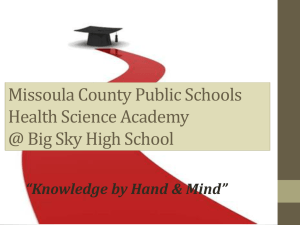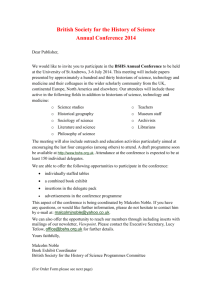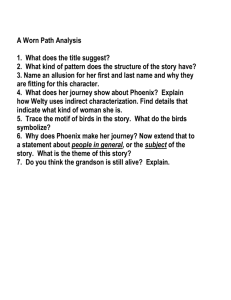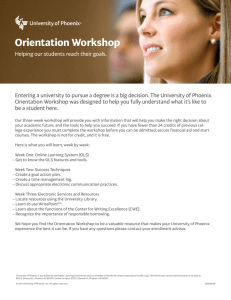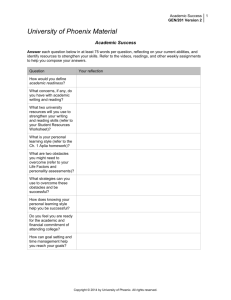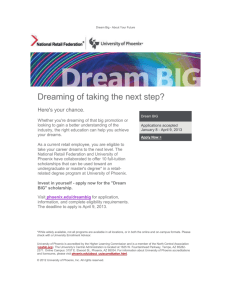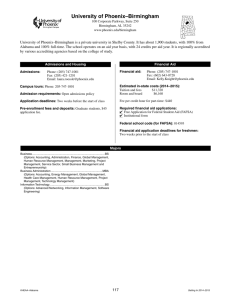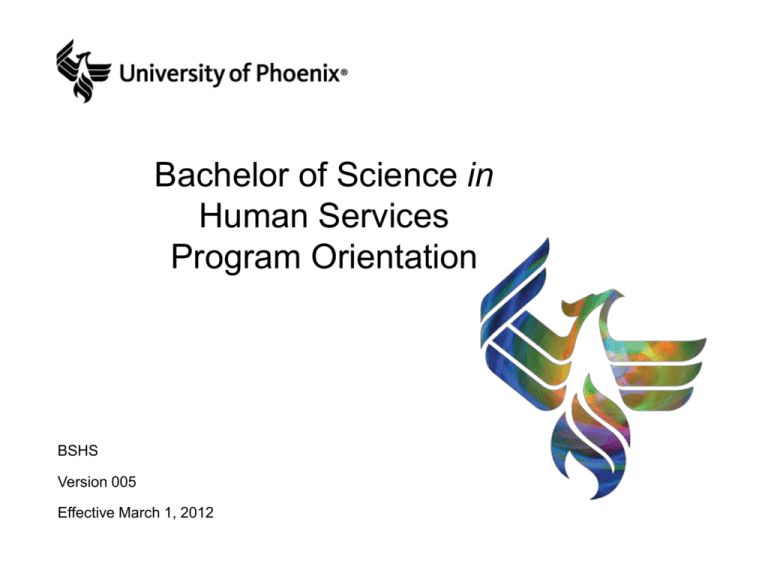
Bachelor of Science in
Human Services
Program Orientation
BSHS
Version 005
Effective March 1, 2012
CONGRATULATIONS!
If you are here, you have just made the
first step in earning your Bachelor of
Science in Human Services Degree at
University of Phoenix.
We welcome you to the
© 2010 University of Phoenix, Inc. All rights reserved.”
BSHS Program!
2
Human Services
“The field of Human Services is broadly
defined, uniquely approaching the objective of
meeting human needs through an
interdisciplinary knowledge base, focusing on
prevention as well as remediation of problems,
and maintaining a commitment to improving
the overall quality of life of service populations”
(National Organization for Human Services,
2010, ¶ 3).
Human Services
“The
Human Services profession is one which
promotes improved service delivery systems
by addressing not only the quality of direct
services, but also by seeking to improve
accessibility, accountability, and coordination
among professionals and agencies in service
delivery” (National Organization for Human
Services, 2010, ¶ 3).
BSHS Program – Next Steps
• You will need to synthesize knowledge across courses in order to
develop your knowledge, skills, attitudes and professional identity in
the field of Human Services.
• Courses are sequenced to introduce content that is then reinforced in
subsequent courses. Courses cannot be taken out of sequence and
have prerequisite courses to move on.
• Content Areas are assessed for assimilation in each course to ensure
you are ready for the next course. You must have a minimum grade
point average (GPA) of 2.0
© 2010 University of Phoenix, Inc. All rights reserved.”
BSHS Program – Additional Steps
• Graduation requires a completion of 120 credits as follows:
• A minimum of 63 upper division credits.
• A minimum of 54 of the 120 credits must be in general education areas
approved by the University.
• Field Experience courses are required. You will be working at
approved sites that have Affiliation Agreements with the University.
Each Field Experience course is 15 weeks in length.
• Each week during the Field Experience courses every student must
attend 2 hours of class and volunteer about 12 hours at their Field
Experience Site. Due to the anticipated extra workload of 20 hours
per week, students may not take other classes concurrently with the
Field Experience classes.
© 2010 University of Phoenix, Inc. All rights reserved.”
CONCENTRATIONS
When you enrolled, you were asked to make a selection of
concentration. BSHS v.005 offers 4 choices of concentration:
Management
Addictions
Gerontology
Family and Child Services
A concentration consists of 3 courses with a foundational pre-requisite
course housed in the core curriculum. Concentration courses may be
taken online or at your campus if offered there. They may be taken
concurrently with other courses with the exception of Field Experience
courses.
© 2010 University of Phoenix, Inc. All rights reserved.”
Human Service Worker Job Title Examples
Case Worker
Family Support Worker
Youth Worker
Social Services Liaison
Residential Worker
Behavioral Health
Management Aide
Case Management Aide
Eligibility Counselor
Alcohol Counselor
Adult Daycare Worker
Drug Abuse Counselor
Life Skills Instructor
Client Advocate
Neighborhood Worker
Social Service Aide
Group Activities Aide
Social Services Tech
Therapeutic Assistant
Probation Officer
Case Monitor
Parole Officer
Child Advocate
Gerontology Aide
Juvenile Court Liaison
Home Health Aide
Group Home Worker
Child Abuse Worker
Crisis Intervention
Worker
Mental Health Aide/Tech
Community Organizer
Intake Interviewer
Community Outreach
Social Work Assistant
Community Action
Worker
Psychological Aide
Halfway House Worker
Case Manager
Rehab Case Worker
Residential Manager
© 2010 University of Phoenix, Inc. All rights reserved.”
NOT a BSHS Worker occupational focus…
• Licensed and/or Clinical Social Workers
• Licensed Professional or Mental Health Counselors
• Clinical and School Psychologists
• Licensed Marriage and Family Therapists
• Medical Doctors, Psychiatrists
• Registered Nurses, Psychiatric Nurses
• Lawyers, Bankers, Financial Planners
• Academic Advisors, Enrollment Advisors
© 2010 University of Phoenix, Inc. All rights reserved.”
FOUNDATION
The BSHS Program begins with a strong foundation comprised of the
first 5 courses:
•
BSHS 305 -
HISTORICAL DEVELOPMENT OF HUMAN SERVICES: AN
INTRODUCTION
•
BSHS 325 -
HUMAN SYSTEMS AND DEVELOPMENT
•
BSHS 335 -
ETHICS AND VALUES FOR HUMAN SERVICE
PROFESSIONALS
•
BSHS 345 -
DIVERSITY AND SPECIAL POPULATIONS
•
BSHS 355 -
DELIVERY OF HUMAN SERVICES: THEORY AND PRACTICE
•
BSHS 375 -
INFORMATION SYSTEMS AND TECHNOLOGY IN HUMAN
SERVICES
© 2010 University of Phoenix, Inc. All rights reserved.”
Client Service Delivery
The BSHS program has a core focus on client service and the
wide range of service delivery pathways:
BSHS 385
-
INTERPERSONAL COMMUNICATION AND INTERVIEWING
SKILLS
BSHS 395
-
CLIENT ASSESSMENT AND PLANNING
BSHS 405
-
INTERVENTION, DIRECT SERVICE DELIVERY AND CASE
MANAGEMENT
BSHS 415
-
FIELD EXPERIENCE I
BSHS 445
-
SURVEY OF CRISIS AND MENTAL HEALTH ISSUES AND
INTERVENTIONS
BSHS 455
-
WORKING WITH ADDICTIONS
BSHS 475
-
FIELD EXPERIENCE II
© 2010 University of Phoenix, Inc. All rights reserved.”
Professional Growth and Identity
The BSHS program is designed with the development of a
Human Services Professional Identity.
Near the completion of the program, an optional board exam is
offered.
Upon successful completion of the Human Services – Board Certified
Human Services Practitioner exam and application to the Center for
Credentialing in Education, you will be board eligible.
The HS-BCP will be offered near the beginning of the second Field
Experience course: BSHS/475.
© 2010 University of Phoenix, Inc. All rights reserved.”
LICENSURE is NOT involved:
• Our program does not prepare you for licensure in
your state. Please review your state’s rules and
licensing board regulations.
• You will not be required to take the Human ServicesBoard Certified Practitioner examination to graduate
from this program. Sitting for the exam is optional.
© 2010 University of Phoenix, Inc. All rights reserved.”
Mental Health
Facilitator
Training and International Registry
© 2010 University of Phoenix, Inc. All rights reserved.”
Mental Health Facilitator Registry
After graduation, you may be registered (not licensed or certified) as
a Mental Health Facilitator through NBCC International, a division of
the National Board for Certified Counselors. MHF Training is
incorporated into the course structure.
Mental Health Facilitators are First Responders:
Community Outreach
Natural Disasters
Trauma and Crisis Workers
“The Mental Health Facilitator (MHF) program is designed to improve
access to mental health care within a given community by educating
and training professionals, paraprofessionals and lay people in the
basics of mental health” (NBCC International, 2012, ¶ 1.).
© 2010 University of Phoenix, Inc. All rights reserved.”
Not Just an Academic Program
• The Bachelor of Science Human Services
Program is an undergraduate degree course of
study.
• Our Field Experience courses are designed to
prepare you for work in the real world as a
human service worker in a wide range of
employment areas.
© 2010 University of Phoenix, Inc. All rights reserved.”
Structure and Sequencing
• The BSHS program is designed with a sequence of courses
beginning with foundational moving through client service
delivery courses and include professional development
coursework.
• Field experience courses may not be taken before completion
of essential requirements.
© 2010 University of Phoenix, Inc. All rights reserved.”
The Coursework
• Two levels for each course:
• Classroom weekly workshops @ 4 hours each. May not miss
more than 1 per course.
• Learning Team Assignments @ 4 hours per week. Learning
Team work is NOT optional and a part of the semester-credit
time commitment for a 3 semester hour course.
© 2010 University of Phoenix, Inc. All rights reserved.”
Core Preferred Sequence*
ID
Title
Historical Development of Human Services: An
Introduction
BSHS/305
CR
Length
Prerequisites
3
5 weeks
Meet Program Admission
Requirements
---
BSHS/325
Human Systems and Development
3
5 weeks
BSHS/335
Ethics and Values for Human Service Professionals
3
5 weeks
BSHS/305, 325;
COMM/215; MTH/209
BSHS/345
Diversity and Special Populations
3
5 weeks
BSHS/335
BSHS/355
Delivery of Human Services: Theory and Practice
3
5 weeks
BSHS/335
BSHS/375
Information Systems &Technology in Human
Services
3
5 weeks
BSHS/335
BSHS/415-O
Orientation to Field Experience
0
1 week
BSHS/345, 355, 375
BSHS/385
Interpersonal Communication & Interviewing Skills
3
5 weeks
BSHS/415-O
BSHS/395
Client Assessment and Planning
3
5 weeks
BSHS/385
BSHS/405
Intervention, Direct Service Delivery and Case
Management
3
5 weeks
© 2010 University of Phoenix, Inc. All rights reserved.”
BSHS/395
Core Preferred Sequence*
ID
Title
BSHS/415
Field Experience I
BSHS/425
Length
Prerequisites
3
15 weeks
BSHS/405
Administration and Management of Human Service
Programs
3
5 weeks
BSHS/405
BSHS/435
Research and Statistics in Human Services
3
5 week
MTH/220
BSHS/445
Survey of Crisis and Mental Health Issues and
Interventions
3
5 weeks
BSHS/405
BSHS/455
Working With Addictions
3
5 weeks
BSHS/445
BSHS/465
Professional Development and Identity
3
5 weeks
BSHS/425, 455
BSHS/475
Field Experience II
3
15 weeks
BSHS/465 and All
Concentration Courses
BSHS/485
Capstone: Advocacy and Creating Social Change
3
5 weeks
BSHS/475
© 2010 University of Phoenix, Inc. All rights reserved.”
CR
BSHS Version 5
Areas of Concentration
Management
Addictions
Gerontology
Family and Child Services
© 2010 University of Phoenix, Inc. All rights reserved.”
Areas of Concentration
The Bachelor of Science in Human Services program offers a
selection of 4 areas of concentration. In addition to completing
the Core Courses, an additional 3 courses must be completed
from the selected concentration before entry into the Field
Experience II Course, BSHS/475. Concentrations are:
Management
Addictions
Gerontology
Family and Child Services
Management
ID
Title
BSHS/426
Human Services Management: Theory and Practice
BSHS/427
BSHS/428
Length
Prerequisites
3
5 weeks
BSHS/425
Critical Thinking Skills in Management Decision Making
3
5 weeks
BSHS/426
Human Service Program Design and Proposal Writing
3
5 week
BSHS/427
© 2010 University of Phoenix, Inc. All rights reserved.”
CR
Addictions
ID
Title
BSHS/456
Addiction Interventions for Human Service Workers
BSHS/457
BSHS/458
Length
Prerequisites
3
5 weeks
BSHS/455
Codependence and Working with Families
3
5 weeks
BSHS/456
Action Planning, Relapse Prevention and Aftercare
3
5 week
BSHS/457
© 2010 University of Phoenix, Inc. All rights reserved.”
CR
Gerontology
ID
Title
BSHS/437
Aging and Social Systems
BSHS/438
BSHS/439
Length
Prerequisites
3
5 weeks
BSHS/345, 355; MTH/220
Care of Ill and Aging Populations
3
5 weeks
BSHS/437
Grief, Loss and End of Life Issues
3
5 week
BSHS/438
© 2010 University of Phoenix, Inc. All rights reserved.”
CR
Family and Child Services
ID
Title
BSHS/406
Family Systems and Social Systems
BSHS/407
BSHS/409
Length
Prerequisites
3
5 weeks
BSHS/405
Family Violence Across the Lifespan
3
5 weeks
BSHS/406
Child Abuse and Neglect
3
5 week
BSHS/407
© 2010 University of Phoenix, Inc. All rights reserved.”
CR
Exams
• You are required to take and submit the MHF pre-test
in BSHS/305. The post-test is required in BSHS/485.
• Instructors may employ a variety of examinations to
assess your assimilation of course content.
• The Human Services-Board Certified Practitioner
exam is offered in BSHS/475 as an optional exam.
Passing the exam and completing the application will
make students Board Certified eligible.
A Lot Happens Between Now…
and Graduation
•Successful completion of this program involves demonstration of
knowledge, skills, and attitudes concordant with the human services
profession. Evaluation of your progress happens in:
*Course grades
*Field Experience
•Ongoing evaluation by individual course faculty combined with faculty
collaborative evaluations.
© 2010 University of Phoenix, Inc. All rights reserved.”
What High Grades Mean
A
B
C
Excellent performance. Work is
exemplary and worthy of
emulation by others.
Good Performance. Work
meets expectations for
graduate-level quality.
Average Performance. Your
GPA must be at this level to
graduate from the program.
© 2010 University of Phoenix, Inc. All rights reserved.”
Field Experience Courses
• Program graduation require completion of 2
Field Experience courses and FE Orientation:
• BSHS/415-O Field Experience Orientation
• BSHS/415 Field Experience I – 15 Week Course: 175
Service Hours.
• BSHS/475 Field Experience II – 15 Week Course: 175
Service Hours
• Can only be accomplished at approved sites with whom
University of Phoenix has an established Affiliation
Agreement.
© 2010 University of Phoenix, Inc. All rights reserved.”
Field Experience Courses
•
Are completed at approved sites under supervision of a qualified
professional.
•
Must attend weekly classes and cannot miss more than 2 classes.
•
Students are responsible for maintaining APPROVED UOP forms
and logs, obtaining site supervisor signatures and faculty supervisor
signatures.
•
Students are responsible for finding their own placement site from
our list of approved sites.
© 2010 University of Phoenix, Inc. All rights reserved.”
Field Experience Courses
•
Doubling Up during Field Experience courses is not allowed.
•
Students must complete and track all Field Experience hourly
requirements on approved forms. Do not make your own forms.
•
Extra hours (up to 75 hours beyond the 175 required) accumulated
and documented while in the Field Experience I course may count
toward your Field Experience II hours. Attending class is not optional
regardless of accumulated service hours.
© 2010 University of Phoenix, Inc. All rights reserved.”
PERSONAL GROWTH
• The program includes components that encourage self-growth
and/or self-disclosure as part of the training. The process is not
optional.
• The program as well as the culture of human services promotes
values of multicultural diversity.
• In addition to the University’s Student Code of Conduct, the
College of Social Sciences has established supplemental
behavioral standards to which our students are held.
© 2010 University of Phoenix, Inc. All rights reserved.”
Your Ethical Responsibility
“As prospective human services workers or
counselors, College of Social Science
candidates are expected to represent the
University as professionals and adhere to the
ethics and standards of their profession as well
as the University’s Student Code of Conduct”
(University of Phoenix Supplemental
Standards, 2020, ¶ 1).
© 2010 University of Phoenix, Inc. All rights reserved.”
SUPPLEMENTAL STANDARDS
• Students in this program are held to a higher
standard than other UOPX programs called
Supplemental Standards.
• The Supplemental Standards set the bar on
professional expectations for behavior, mental
wellness, social interaction and following the
applicable Code of Ethics.
© 2010 University of Phoenix, Inc. All rights reserved.”
Our Professional and Ethical Responsibility
• Through systematic developmental assessment, faculty follow due
process standards as expressed in the University’s Student
Handbook and College’s Supplemental Standards.
• We have a responsibility not to promote through the program
students whose personal, professional, and academic standards do
not meet standards delineated in those specifications and ethical
codes.
• Site supervisors (at your field experience sites) also provide input as
to your fitness to enter the human services field.
• Faculty exercise academic freedom within parameters, and provide
academic performance evaluation criteria in their syllabi as
elaborated in class according to established curriculum guidelines.
© 2010 University of Phoenix, Inc. All rights reserved.”
GETTING THE MOST
OUT OF YOUR
EDUCATIONAL
EXPERIENCE…
MAKING IT WORK
© 2010 University of Phoenix, Inc. All rights reserved.”
HINTS FOR SUCCESS
•
Get to know your faculty and let them know you.
Members of the faculty want you to be successful.
•
Ask questions that will help you to learn.
•
Adopt a positive perspective on your training.
•
Become involved in your profession with membership
in professional organizations.
GET TO KNOW EACH OTHER
Pair up with someone you haven’t had a visit
with yet and talk until you find at least one
thing in common. Look for things that are more
unusual versus more usual (e.g., we both
broke our legs when we were teens, versus
we’re both married).
© 2010 University of Phoenix, Inc. All rights reserved.”
BE AN ACTIVE LEARNING TEAM MEMBER
•
What might be the most positive aspects of using a
team approach in an academic environment?
•
What concerns might you have about being in a
team?
•
Discuss what traits and behaviors that you would like
to see in fellow team members.
•
How would you present these traits and behaviors
yourself as a learning team member?
© 2010 University of Phoenix, Inc. All rights reserved.”
QUIET LEARNING TEAM MEMBERS
• Imagine that one of your team members is very quiet and does
not participate at the level that the rest of the team believes is
necessary.
• How would you communicate this to the quiet team member?
• What would you be sure not to say?
• How would you like to be approached if you were perceived as being
overly quiet and passive by your team?
• What would be your approach if you were already a counselor?
© 2010 University of Phoenix, Inc. All rights reserved.”
LEARNING TEAM CONFLICT
• Imagine that two members of your team constantly
disagree. At times they raise their voices and refuse to
listen to the other person’s opinion. The team is having
a hard time getting tasks completed and all of the team
members are worried about getting good grades.
• What could team members do to try to resolve the situation?
• How should a counselor approach individual, group or team
conflict?
• Pair up with someone you do not know and brainstorm at least
3 strategies for resolving Learning Team Conflict.
© 2010 University of Phoenix, Inc. All rights reserved.”
FAQs
Frequently Asked Questions…
© 2010 University of Phoenix, Inc. All rights reserved.”
What is the Mental Health Facilitator
Registry?
And…why do I want to be included?
• The MHF Registry is maintained by the NBCC International
(NBCC-I).
• Being listed on the International Registry documents your
completion of specialized training in the recognition of mental
health issues and appropriate actions for first responders.
• Listing on the International Registry can be included on your
résumé or CV.
• The MHF International Registry provides the foundation for
additional training as an MHF trainer in your community.
© 2010 University of Phoenix, Inc. All rights reserved.”
How do I get on the MHF International
Registry?
After program completion interested graduates will be provided
an application form for you to send to NBCC-I.
There is an application fee of $20.00 to be included with your
application.
There is a yearly maintenance fee of $20.00.
NBCC-I will mail you a certificate of registration.
You must renew your registration every 5 years.
© 2010 University of Phoenix, Inc. All rights reserved.”
FAQ
What happens if a Supplemental Standard
is not followed?
A referral letter from the Campus College Chair (or designee) will be sent
by FedEx outlining the issues and requesting a response from the
student. Consequences are dependent on the severity and consistency
of the charge. Dismissal from the program is possible.
FAQ
What if I miss more than 1 class in a 5
week course?
You will be summarily dismissed from the program!
Just kidding…you will be auto dropped from the
course. Excused 2nd absences must meet stringent
criteria and be approved by the Director of Academic
Affairs.
© 2010 University of Phoenix, Inc. All rights reserved.”
FAQ
Where do I find the approved site list for the field
experience courses?
The Campus College Chair or designee can provide the list.
I have a field experience site and site supervisor already
selected, but they are not on your approved list. What
do I do?
Email your Campus College Chair for instructions. The process to gain
site approval can take several months.*
© 2010 University of Phoenix, Inc. All rights reserved.”
FAQ
I had an instructor in an earlier class that I
don’t want again, but they are scheduled for
one of my upcoming courses. Can I change?
The scheduling of instructors and instructor selection
process is thoughtfully considered before an instructor is
assigned to a course. Professionalism is expected of all
students in a counseling program.
© 2010 University of Phoenix, Inc. All rights reserved.”
FAQ
My Learning Team members don’t like
me and/or I don’t like them. Can I be
assigned to a new Learning Team?
Students in a counseling program are held to a
higher standard and expected to demonstrate
professional counselor behavior at all times.
Conflict resolution is a part of this process.
© 2010 University of Phoenix, Inc. All rights reserved.”
WELCOME!
Welcome to the University of Phoenix
Bachelor of Science in Human Services
Program!
Let the adventure begin!
BSHS Program
References
Bureau of Labor Statistics (2010). Occupational outlook handbook, 2001-11 Edition. Retrieved
from http://www.bls.gov/oco/
National Board for Certified Counselors – International (2012). Mental Health Facilitator. Retrieved
from http://www.nbccinternational.org/mhf
National Organization for Human Services (2010). The National Organization for Human Services.
Retrieved from http://www.nationalhumanservices.org/
University of Phoenix (2010). Supplemental standards for candidates in College of Social
Sciences – Counseling Programs. Phoenix, AZ: Author.
© 2010 University of Phoenix, Inc. All rights reserved.”

